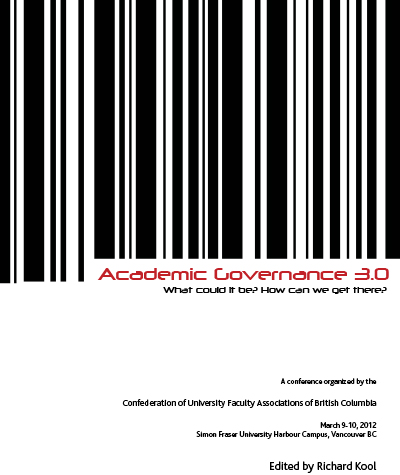University governance should be democratic, effective, and support high-quality programs, academic freedom, and academic integrity. In 2012, CUFA BC held a conference in collaboration with member associations and allied organizations to examine the current state of university governance and its potential for improvement. This paper documents conversations and presentations from the conference, including:
- Academic Governance: an End or a Means?, Richard Kool, CUFA BC and Royal Roads University
- Conference Welcome, David Mirhady, CUFA BC
- Trends in Academic Governance in Canada, Glen Jones, Ontario Institute for Studies in Education
- Setting an Academic Governance Research Agenda for BC, Robert F. Clift, CUFA BC
- Librarians, Governance, and the “Petch Procedures” at the University of Victoria, Chris Petter, University of Victoria
- Academic Governance 3.0: Past, Present and Future, John M. Usher, University of Lethbridge
- The Future of Academic Governance in Canadian Universities, Claire Polster, University of Regina
- Activating the Senate, Engaging with the Board, at the University of Northern BC, Erik Jensen, University of Northern BC
- Power, Money, and Governance at UBC: The Universitas 21 Mini-Scandal, William Bruneau, University of British Columbia
- Governance Transition: From College to University, Zena Seldon & Thompson Rivers University
- Closing Remarks: Countering the Stockholm Syndrome, Cindy Oliver, Federation of Post-Secondary Educators of BC
- Closing Remarks: Easing into the Conversation, Robert M. Abbott, Abbott Strategies and the BC Climate Change Secretariat
- Postscript: One Way Forward: Taming the Third Power, Robert F. Clift, CUFA BC
“Academic integrity is the outcome of two things: academic freedom and appropriate academic governance.”
- Excerpt

